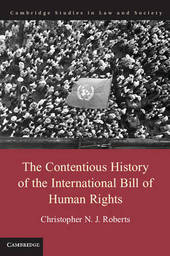
|
The Contentious History of the International Bill of Human Rights
Paperback / softback
Main Details
| Title |
The Contentious History of the International Bill of Human Rights
|
| Authors and Contributors |
By (author) Christopher N. J. Roberts
|
| Series | Cambridge Studies in Law and Society |
|---|
| Physical Properties |
| Format:Paperback / softback | | Pages:255 | | Dimensions(mm): Height 229,Width 152 |
|
| ISBN/Barcode |
9781107601635
|
| Classifications | Dewey:341.4809 |
|---|
| Audience | | Professional & Vocational | |
|---|
| Illustrations |
5 Halftones, unspecified
|
|
Publishing Details |
| Publisher |
Cambridge University Press
|
| Imprint |
Cambridge University Press
|
| Publication Date |
31 October 2014 |
| Publication Country |
United Kingdom
|
Description
Today, the idea of human rights enjoys near-universal support; yet, there is deep disagreement about what human rights actually are - their true source of origin, how to study them, and how best to address their deficits. In this sweeping historical exploration, Christopher N. J. Roberts traces these contemporary conflicts back to their moments of inception and shows how more than a half century ago a series of contradictions worked their way into the International Bill of Human Rights, the foundation of the modern system of human rights. By viewing human rights as representations of human relations that emerge from struggle, this book charts a new path into the subject of human rights and offers a novel theory and methodology for rigorous empirical study.
Author Biography
Christopher N. J. Roberts is an associate professor at the University of Minnesota Law School and an affiliated faculty member of the Department of Sociology. His research spans the areas of human rights, citizenship, social theory, concept formation, and jurisprudence.
Reviews'This book is simply splendid. The Contentious History of the International Bill of Human Rights tackles an issue of tremendous importance today and powerfully demonstrates how the legacies of past injustice are still with us, still shaping international law. It is deeply researched, beautifully written, surprising, devastating. It deserves to make a substantial impact among human rights scholars across the disciplines and carries important lessons for human rights activists as well.' Elizabeth S. Anderson, Arthur F. Thurnau Professor and John Dewey Distinguished University Professor of Philosophy and Women's Studies, University of Michigan 'In this paradigm-shifting analysis, Christopher N. J. Roberts demonstrates, through a series of gripping narratives, the strength of a new interdisciplinary scaffolding for the study of rights: from human rights as would-be possessions of individuals to human rights as the markers of emergent struggles for power and control over social relationships and institutional arrangements, especially those concerning race and inequality. The book is a brilliant achievement that will forever change the conversation about the meaning and emancipatory potential of human rights today.' Margaret R. Somers, University of Michigan 'This book is an ambitious and well-executed historical analysis of the struggles that led to the formulation and ultimate adoption of the International Bill of Human Rights. It sustains an argument as convincing as it is provocative: that the long acknowledged gap between human rights ideals and practice is not simply the result of a lack of political will or enforcement capacity, but can rather be traced to fundamental ambiguities and contradictions built into the agreements themselves. Both analytically rigorous and eminently readable, this book will be required reading for any serious student of human rights. Legal scholars, but also social scientists, historians and engaged citizens of the world community should all find something of interest here.' Robert S. Jansen, University of Michigan 'This book ... opens the door for other interpretative histories that explore the contestations of human rights from the diverse perspectives of people in other parts of the global North and South.' Bonny Ibhawoh, Canadian Journal of History '... Roberts has found a good equilibrium apt for its purpose. This is a strong contribution to a strong field, with an unusual capacity to find a broad catchment of readers.' Roland Burke, Journal of Contemporary History
|